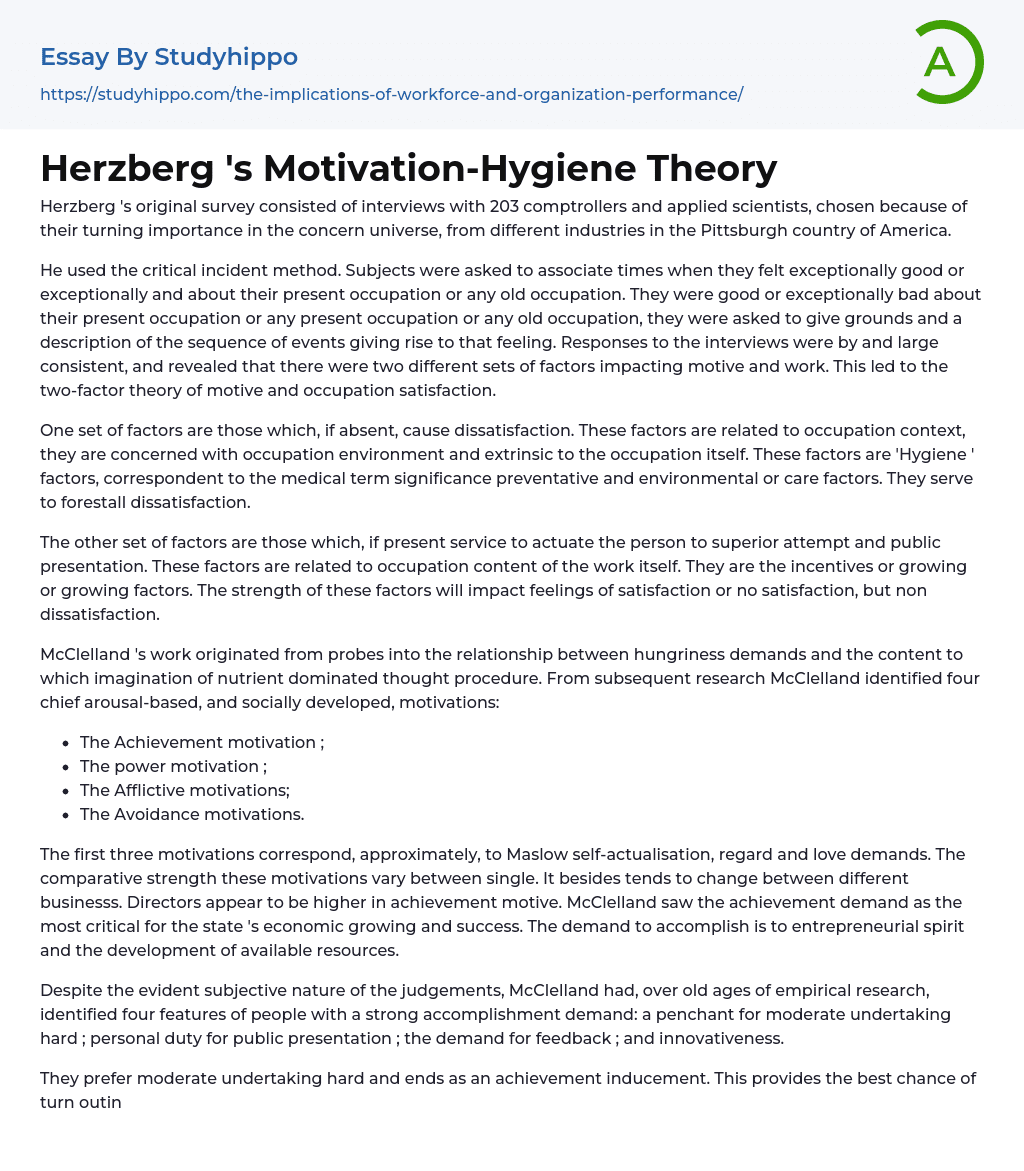Herzberg conducted a survey with 203 comptrollers and scientists in the Pittsburgh area of America. The individuals were selected due to their significance in the business world and came from various industries. Herzberg utilized the critical incident method, where participants were requested to recall instances when they experienced notably positive or negative emotions regarding their current or previous job. They were then prompted to provide reasons and describe the series of events that led to those feelings.
Overall, the responses to the interviews showed consistent findings. It was discovered that there are two distinct categories of factors that influence motive and job satisfaction. This led to the creation of the two-factor theory, which examines both motivational and contextual elements. The first category, known as 'Hygiene' factors, consists of aspects that, when lacking, result in dissatisfactio
...n. These factors are related to the work environment and are external to the job itself. They can be compared to preventive measures in medicine as they work to prevent dissatisfaction.
The second set of factors are those that, if present, motivate individuals to excel and perform better. These factors are associated with the job itself, such as incentives for growth or development. The intensity of these factors will determine whether individuals feel satisfied or not dissatisfied, but not dissatisfied.
McClelland's work began with an investigation into the connection between hunger needs and the extent to which thoughts about food dominated the thinking process. Through subsequent research, McClelland identified four main motivations that are based on arousal and socially developed:
- The Achievement motivation;
- The Power motivation;
- The Afflictiv
motivations;
The first three motivations roughly correspond to Maslow's self-actualization, esteem, and love needs. The relative strength of these motivations varies between individuals and also differs across different industries.
According to McClelland, directors seem to have a higher achievement motive. He believed that the demand for achievement was crucial for economic growth and success in a state. This demand is linked to the entrepreneurial spirit and the utilization of resources. Despite the subjective nature of these judgments, McClelland conducted extensive empirical research over the years and identified four characteristics of individuals with a strong achievement demand: a preference for moderate challenges, taking personal responsibility for performance, seeking feedback, and being innovative. Directors prioritize moderate challenges and set goals as a motivator for achievement.
This offers the greatest opportunity for them to improve. If the task is too risky, it would decrease the chances of success and achieving fulfillment. If the course of action is too simple or too safe, there is minimal excitement in accomplishing the task and little satisfaction from success. They prefer being personally responsible for their performance. They strive to achieve success by focusing on their own abilities and efforts rather than relying on teamwork or external factors beyond their control.
Personal satisfaction comes from achieving a task and does not necessarily require acknowledgment from others. These individuals desire clear and precise feedback to assess their performance. They need timely information on the outcomes to evaluate their own success or failure in completing the task, without relying on outside recognition. Moreover, they possess a more advanced mindset.
As they constantly seek challenging tasks, they are
inclined to move towards more ambitious endeavors. In their search for shortcuts, they are more likely to cheat. There is a continuous pursuit of diversity and information to discover innovative methods of accomplishing tasks. They are constantly unsatisfied and avoid routine, also tending to progress further.
- 1920S essays
- 1950S essays
- 1960S essays
- 19Th Century essays
- 20Th Century essays
- Ancient Greece essays
- Bravery essays
- British Empire essays
- Civilization essays
- Colonialism essays
- Declaration of Independence essays
- Evidence essays
- Genocide essays
- Gilded Age essays
- Historical Figures essays
- Historiography essays
- History of the United States essays
- Letter from Birmingham Jail essays
- Louisiana Purchase essays
- Nazi Germany essays
- Rebellion essays
- Revolution essays
- Roman Empire essays
- Russian Empire essays
- The Columbian Exchange essays
- Vikings essays
- War essays
- What is History essays
- World History essays
- World Hunger essays
- American Dream essays
- Barriers To Entry essays
- Capitalism essays
- Central Bank essays
- Compensation essays
- Consumerism essays
- Economic Development essays
- Economic Growth essays
- Economic Inequality essays
- Economic System essays
- Economy essays
- Employment essays
- Export essays
- Finance essays
- Free Trade essays
- Gross Domestic Product essays
- Human Development essays
- Income Inequality essays
- Industry essays
- Inflation essays




